Location
Akhaltsikhe, Akhaltsikhe municipality, Samtskhe-Javakheti region, Georgia
Community Description
Akhaltsikhe is a small city of 30,000 people and the regional center of Samtskhe-Javakheti.
Samtskhe-Javakheti is one of the most ethnically and culturally diverse areas in the Caucasus and has a large Armenian population. The area is very conservative in nature and its people struggle with incredibly high unemployment and associated economic challenges.
Akhaltsikhe Nursery #1 serves 60 children under the age of four, who spend weekdays from 10 a.m. to 6 p.m. in the facility.
 The nursery is funded by the local government. However, as with many areas in Georgia, the government’s budget is small and the nursery is often faced with developing its own solutions to the continual funding problems and lack of resources. Additionally, while there are international and local non-governmental organizations in Akhaltsikhe, their work tends to target the villages surrounding the city.
The nursery is funded by the local government. However, as with many areas in Georgia, the government’s budget is small and the nursery is often faced with developing its own solutions to the continual funding problems and lack of resources. Additionally, while there are international and local non-governmental organizations in Akhaltsikhe, their work tends to target the villages surrounding the city.
Akhaltsikhe Nursery #1 is fortunate to have a caring and dedicated staff that, when possible, purchases toys, clean water and other necessities for the children. However, this is not a sustainable solution and the quality of the care in the nursery often suffers as a result.
Various water and sanitation problems exist at the school. Currently, there is one working water spout in the director’s office. Depending on the day, this spout has water for 2-4 hours per day, due to city water supply issues. In winter, the water they do have is near freezing due to the cold Georgian winters and lack of reliable heating systems.
When possible, staff purchases water and rations it throughout the day. This is problematic, as these 11 staff members need water to wash hands, faces and bodies, to clean the floors and other play equipment, and to prepare food.
Perhaps most importantly, the toilet and bathroom are not usable, as the pipes were never connected when the new bathroom was constructed many years ago.
In addition, the water storage tank, necessary to store water for off-hour use, is not functional.
 Finally, the kitchen does not have drainage to allow the cooks to dispose of waste liquids.
Finally, the kitchen does not have drainage to allow the cooks to dispose of waste liquids.
Project Description
This project is to bring clean, fresh water to the nursery and remedy the various sanitation problems.
This project has three parts:
First, the bathroom will be made functional by piping water from the director’s office to the bathroom next door. The floor will be removed and water pipes installed, resulting in a working sink, faucet and toilet for all to use.
Second, the damaged water storage tank will be repaired, resulting in access to water 24 hours a day, regardless of the city’s limitations. This tank will be connected to the water heater, which is in good condition but hasn’t been used since the tank was damaged five years ago.
Finally, a new drain will be installed in the kitchen, which will allow the cook to pour water and other liquid waste down the drain instead of in the yard where the children play in the spring, summer, and fall.
All the work will be done by a local handyman.
Water Charity funds will be used to purchase pipes and other necessary materials, plus to pay a small amount for the labor of the handyman.
Project Impact
71 people, consisting of 60 children and 11 staff, will benefit from the project.
Peace Corps Volunteer Directing Project
McKinze Cook
Comments
This is a necessary infrastructure project for the nursery. Access to fresh water will allow the children to eat, play, sleep, and learn in a cleaner and healthier environment.
Dollar Amount of Project
$555.00
Donations Collected to Date
$555.00
Dollar Amount Needed
$0.00 – This project has now been fully funded through the generosity of The Soneva SLOW LIFE Trust as a part of their Clean Water Projects initiative.
We encourage others to continue to donate using the Donate button below, and we will notify Peace Corps Volunteer McKinze Cook of your donation. Additional funds will be used to fund the next project by McKinze and/or those of other PCVs in the country of service.
![]() This project has been finished. To read about the conclusion of the project, CLICK HERE.
This project has been finished. To read about the conclusion of the project, CLICK HERE.